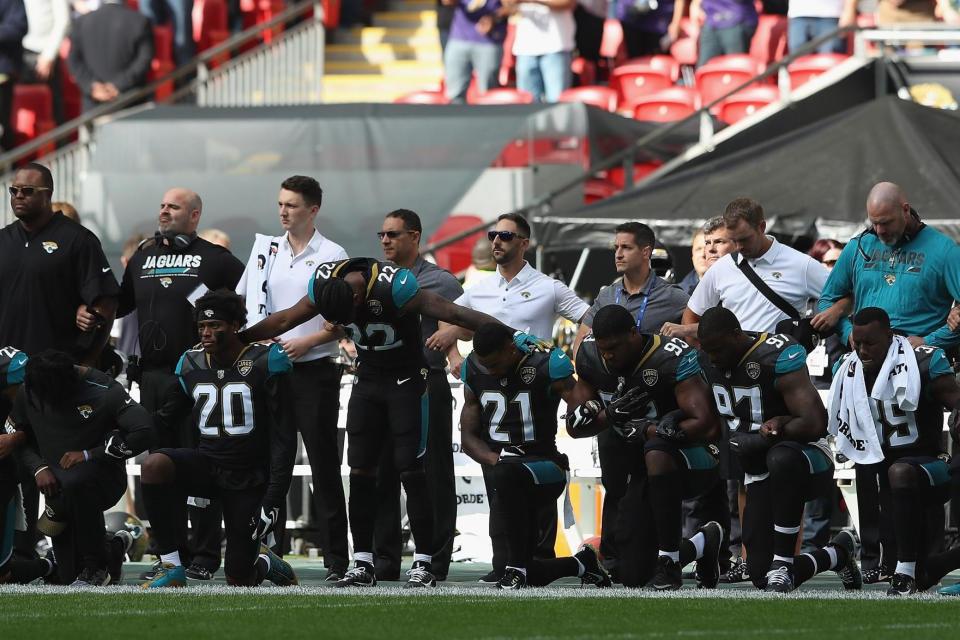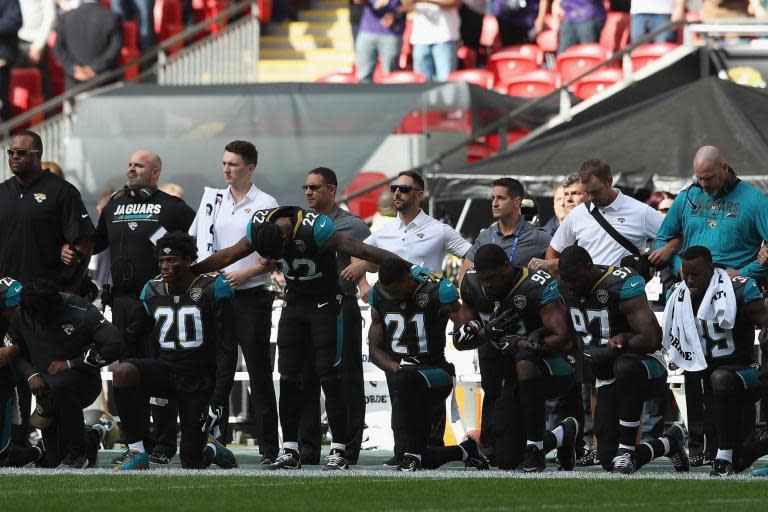Let our icons stand up - or kneel - for their political beliefs, writes Tony Evans
Wembley is an unlikely venue for an American political row. Sunday’s NFL match between Jacksonville Jaguars and Baltimore Ravens will not be remembered for the Florida team’s 44-7 rout, but for the protests by members of both clubs.
More than 20 players and staff knelt during their national anthem. The demonstrations started last year when Colin Kaepernick of the San Francisco 49ers dropped to his knee during The Star Spangled Banner.
Dismayed by fatal police shootings of unarmed black suspects, Kaepernick used his fame to make a point.
A few NFL players and a smattering of athletes in other sports joined the quarterback, who has been without a job since leaving the 49ers in March. The issue was largely dormant until Friday, when Donald Trump sparked the controversy back into life.
The president launched an attack on protesting players and demanded NFL owners sack them. On Sunday, more players than ever followed Kaepernick’s lead. Owners backed their employees’ right to protest.
Politics and sport create a thorny issue. It’s ironic that this happened at Wembley on the day it emerged that Fifa are about to allow the home nations to wear poppies on their kits. Poppies, most people believe, are an act of remembrance, not a political statement. Tell that to James McClean.
The West Brom midfielder spends the autumn being pilloried for his refusal to wear a poppy on his kit. McClean is from Derry, where the 1972 Bloody Sunday shootings are part of the collective memory. McClean’s views are anathema to most people but they are no less valid.
An inevitable cry goes up when a sporting figure makes a gesture that goes against prevailing opinion: keep politics out of sport.
But how? History has vindicated some of the most powerful sporting protests, especially those with racial overtones.
Tommie Smith and John Carlos’s Black Power salutes at the 1968 Mexico Olympics are an iconic image of the struggle for equality. The runners were reviled at the time.
Muhammad Ali became one of the most significant figures of the 20th century and an instigator of change. Would life be richer if Ali had confined his interests to boxing?
The timing of the poppy news is apposite. In America, there has been an attempt to conflate kneeling for the anthem with disrespect for the military. Soldiers, sailors and flyovers are a common part of NFL pre-game ceremonies. It is a trend increasingly seen in Britain. FA Cup Finals and England matches feature honour guards of service people.
The irony is that in America in the past half-decade, it was something more than a spontaneous tribute. Last year, it emerged that the US government paid franchises to involve military personnel in gameday broadcasts. “Paid Patriotism” was a recruitment advertising campaign by stealth. It caused enough of a scandal for the NFL to stop such activities. The FA have never charged the military.
Politics adds richness and pertinence to sport. We want our heroes to be committed, yet it troubles some people if they display political conviction.
Players should not leave their beliefs in the dressing room. Our sporting icons should be able to stand up - or kneel - for their principles whether we like their views or not.

 Yahoo News
Yahoo News 

